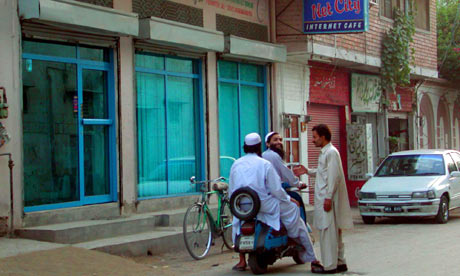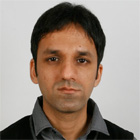'People will forgive you for being wrong, but they will never forgive you for being right - especially if events prove you right while proving them wrong.' Thomas Sowell
Search This Blog
Showing posts with label Urdu. Show all posts
Showing posts with label Urdu. Show all posts
Sunday, 26 July 2015
Wednesday, 17 April 2013
The Writer and his Politics
Tarek Fatah in India
Problems in Pakistan
How Traitor & British Agent Jinnah Got Pakistan? - Tarek Fatah
Sunday, 29 April 2012
Some Myths Work

UP and Sindh, joined by history, divided by secular democracy
Tahir Mehdi (The writer works for Punjab Lok Suhag, a research and advocacy
group in Pakistan, with an interest in understanding governance and
democracy. He also writes a regular blog in Dawn.com)
The two regions of the subcontinent, Uttar Pradesh in India and Sindh in Pakistan, have both a unique bond and a disconnect. First, the bond: a huge number of Muslims from Uttar Pradesh migrated in 1947 to Sindh. People with Urdu as their mother tongue comprise 21 per cent of Sindh—every fifth inhabitant of Sindh belongs to second or third generation migrants from India, in particular from UP. References to forefathers’ villages, towns or jagirs still moisten many eyes and inspire nostalgia. They all had migrated willingly or unwillingly in pursuit of a peaceful society and prosperity. Their children’s textbooks kept on reminding them over next decades that the cherished dream could never be realised with Hindus roaming around and dominating everything.
The same Uttar Pradesh recently elected members for its 403-seat state assembly. Muslims still live in that province that has a population higher than Pakistan. UP’s population, according to the 2011 census, is 199.6 million. Of these, 19.8 per cent are Muslims. Or, every fifth inhabitant of present-day UP is a Muslim. Muslim candidates were serious contenders for around half of the general assembly seats. In fact, 68 of them went on to become MLAs; 64 Muslims stood second in the constituencies they contested in.
Almost every party fielded Muslim candidates. The Samajwadi Party’s Adil Sheikh defeated assembly speaker Sukhdev Rajbhar, former minister Nand Gopal Gupta was drubbed by SP’s first-timer Haji Parvez Ahmed and four-time BJP winner Inder Dev Singh lost to Mohammad Ghazi. No one cried foul, no allegations of rigging were hurled, no conspiracy theories of undermining Hindutva made the rounds and, above all, no one smelt the infamous ‘foreign hand’ behind the defeat of caste Hindus at the hands of ‘pariah’ Muslims.
The Samajwadi Party raised its tally from 97 (in 2007) to more than a simple majority of 224; the ruling Bahujan Samaj Party crashed from 206 seats to a humble 80. The massive reversal was caused by a four per cent swing in votes, and critics attribute SP’s ascendancy to winning the Muslim vote. Remember that UP is where the capital of Urdu culture, Lucknow, is located; so also the epicentre of Hindutva politics, Ayodhya, and the hometown of secular Indian nationalism (read Congress), Rae Bareli. It’s here that minority Muslim voters have so decisively swung political fortunes. But we were always told that in a democracy where Hindus outnumbered us, we would be forced to live miserable lives on the margins. I was flabbergasted. Does it not turn our history into a farce?
I am not saying that everything is exceptionally bright across the border. People in India too face mammoth challenges—but wait, I think I should not be apologetic about what I want to say and subdue my argument before actually forwarding it, to avoid being labelled unpatriotic. I better say it loud and clear.
Thousands of Hindus migrated from Sindh to India after Partition and are spread all over India. Today, many are prosperous. But, willingly or unwillingly, a few hundred thousand did not migrate. Non-Muslims in Sindh are around 9 per cent of the population, or half the percentage of Muslims in UP. Have you ever heard of a non-Muslim contesting elections and winning too?
They couldn’t even think of such a feat till 2002, when non-Muslims were corralled into reserved seats under the separate electorate system, while Muslim candidates vied for their co-religionists’ votes alone. Two elections ago, we moved to the joint electorate system; since then, only one Hindu candidate for a national assembly seat has polled votes in thousands—Mahesh Kumar, a Pakistan People’s Party nominee. He lost to Arbab Zakaullah of the Pakistan Muslim League by a margin of over a hundred thousand. Rajveer Singh, a Pakistan Muslim League-Functional candidate for the provincial seat of Umerkot, too stood a distant second to the PPP’s Ali Mardan Shah. Dr Daya Ram of the PPP is the only Hindu elected on a provincial seat to date.
That is the disconnect between Sindh and UP. One’s faith in democracy is unwavering, while we have heaped scorn over it for its inability to deliver, and instead have been beating dead horses hoping it would take us to a cherished future. We were told that democracy doesn’t work for us Muslims. It is alien to our culture, and comes to fruition when pollinated by secularism alone, which is heretic. Let me confess today: if being secular means having faith in democracy, I profess it, as I have seen it work miracles.
Friday, 20 April 2012
Ways of bidding Farewell - Goodbye, God be with you, Khuda Hafiz, Allah Hafiz...
In Pakistan, saying goodbye can be a religious statement
To some, the growth of 'Allah hafiz' over 'Khuda hafiz', using a Qur'anic rather than Urdu name for God, is a symbol of change

Pakistanis who continue to use 'Khuda
hafiz' see the phrase as 'part of an ideological battle to retain what
they see as a more pluralistic approach towards religion'. Photograph:
M. SAJJAD/AP
Until about 10 years ago "Khuda hafiz", which means "God protect you", was the phrase commonly used to say goodbye. But, in the past decade, "Khuda hafiz" began to be overtaken by a new term "Allah hafiz". Now, "Allah hafiz" is used by everyone from religious clerics to fashion models and the country's top TV anchors.
While languages change and evolve with time, and Pakistan certainly has bigger problems such as corruption and militancy, the alteration has unsettled liberals in Pakistan, who say it reflects a wider change in the country's cultural landscape.
Khuda is the Urdu word for God, borrowed from Persian. Yet today, some people claim that Khuda can refer to any God, while Allah is the specific name for God in the Qur'anic scripture. Others have gone so far as to claim the word Khuda may even have pagan origins.
The promotion of "Allah hafiz" first began in the 1980s under the rule of General Zia-ul-Haq when Pakistan was involved in the US- and Saudi-backed jihad against the Soviet occupation of Afghanistan. According to some reports, "Allah hafiz" was first used in public in 1985 by a well-known TV host on the state-run PTV. However it would be years later that the greeting took off.
The arguments used by Muslims who are against using the name Khuda appear similar to the ones used by those Christians in the United States who say Allah is a different God to the one they worship. There is no denying there are key theological differences between Islam, Christianity and other religions when it comes to the nature of God, but these don't necessarily mean people from different faiths can't use the same name, while simultaneously holding on to their own unique beliefs.
A few years back, a Roman Catholic bishop from the Netherlands, Tiny Muskens, attracted media interest after calling on people of all faiths to use the name Allah for God: "Allah is a very beautiful word for God. Shouldn't we all say that from now on we will name God Allah? What does God care what we call him? It is our problem."
And millions of English-speaking Muslims have no hesitation in using the name God to refer to Allah. There are more than 10 million Christians who live in the Middle East who use Allah to refer to God. In Malaysia, there has been controversy on the matter for years about Christians being allowed to use Allah to refer to God, with even churches being attacked by some Muslims who object.
Some have speculated the name Khuda may actually come from the word "Khud" which means "self" ("Khud-a" therefore translating as "self-revealing"). In Pakistan, the name Khuda is rooted in the very culture and history of the country. In the national anthem the final verse makes a reference to Khuda. A few years back a very popular film came out with the title Khuda Kay Liye ("For the Sake of God"). When former president Pervez Musharraf left office in 2008 he famously said in his farewell speech "Pakistan ka Khuda hafiz hai" ("God protect Pakistan").
Some continue to use the "Khuda hafiz" despite the popularity of "Allah hafiz". To these people, "Khuda hafiz" is part of an ideological battle to retain what they see as a more pluralistic approach towards religion, yet for others it is tradition or nostalgia that keeps the usage alive. Outside Pakistan, "Khuda hafiz" is also known to be used in Iran, Afghanistan, Tajikistan and among Muslims in India.
Interestingly, while Allah is an Arabic word, the Arabs themselves don't use "Allah hafiz" – which is a purely Pakistani-manufactured invention mixing Arabic with Persian. Rather the Arabs use "ma salama" or "Allah ysalmak" when parting company. And for any who feel there is no need to mention God in a greeting in any language, remember even the English word "goodbye" derives from "God be with you", which was the standard greeting at one time.
Subscribe to:
Posts (Atom)
